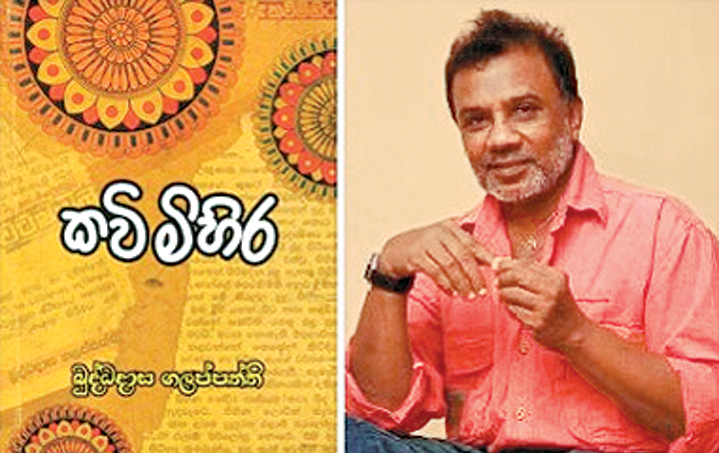Shifting gradually from his earliest mainstay of interest in the theatrical activities with emphasis on make up and other behind-the-stage activities, but not entirely abandoned, the veteran writer, poet, short story writer, Buddhadasa Galappatty has taken more time devoted to poetry and Sinhala column writing.
To the best of my knowledge, Buddhi, as he is known to us, is one person who reads almost all the Sinhala poems that appear in the book market. Most of the Sinhala poems that come out are not only read by Buddhi, but takes pains writing a regular column titled as ‘Kavi Mihira’ which appear in a Sinhala daily.
 He takes care to read them and picks out the best in order to introduce them to fellow readers. The Kavi Mihira is now collected in the form of anthologies. This year marks the appearance of the third volume which runs to a bulky 396-page work.
He takes care to read them and picks out the best in order to introduce them to fellow readers. The Kavi Mihira is now collected in the form of anthologies. This year marks the appearance of the third volume which runs to a bulky 396-page work.
Social media
In this volume of poems there are 72 poets. All of them are newcomers to the creative field. There are three main areas that are touched by Buddhi. Firstly the picking process presumably is one of the hardest as it is not only a printed selection but also the social media where a lot of poetry is exhibited as pioneer skills. Secondly come the author publications which reach him regularly.
Thirdly are the appearances of the early or the more known poets out of which he picks his choice giving vent to the more social significance. Perhaps this area is the most controversial area, as it lingers on to the element of ideological preference than anything else. When all is said and done this is an arduous task where there are overridings and competitions. Sinhala poetry today has come to stay as one of the overpowering creativities in the literary scene.
But most of them go unnoticed. Unlike in most other countries, some of them never get translated either into English or to any other language despite the merits they hold. Buddhi is noticeable about the matter and he feels that some of these modern day Sinhala poems ought to be translated.
Some of the finest poems as picked up by Buddhi come from the poets like Anurasiri Hettige, Subhashini Dharmaratne, Ajith Nishantha, Upul Senadhirige, Anuradha Nilmini, Kumara Hettiarachchi, Narmada Wickramaarachchi, Troy Mahamohottala, Sunita Koswatta and Liyanage Amarakirti.
Controversial point
I felt a certain degree of freshness on seeing these poems lined up as an anthology. But to what degree at extent to which they are discussed at large could be a controversial point. This anthology has faced upheavals as a commodity meant to mark the annual book fair at the State Literary Festival. Most poems come as debut create works that need the support from some social sector. But it is clearly observed that compilers of the calibre of Buddhi, try hard to promote the dictum of Mao Tse Tung, which meant as ‘let thousand flowers bloom’. The same could be said about the poetic conventions. I see that though they are overpoured.
The discussion and the critical evaluations are a drawback. Even at the school level most teachers of literature find it difficult to go beyond the prescribed text which is compiled in haste and unmethodically. This has been lingering on for some time.
Contemporary eye
Buddhi too has brought out his column titled as ‘Edawasa Sondurumaya’, one I received in the fourth volume, packed with varying types of reminiscences, notes, short profiles, and belles letter cum nostalgic material.
I felt that this is not only one way securing the writings of a person who is wide awakened to the socio-political nuances, but also a series of contemporary eye openers to the more latent perspectives of the day.
All in all, I felt that Buddhi’s collections contributions to daily papers and journal never go wasted.



Add new comment